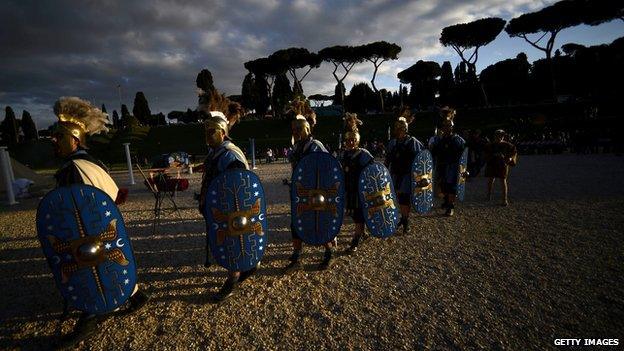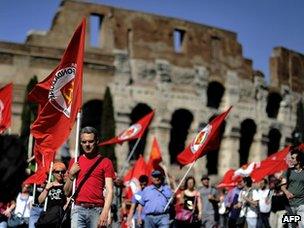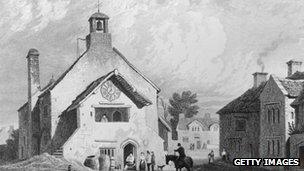Viewpoint: The time Britain slid into chaos
- Published

The social unrest, economic gloom and austerity in Europe today mirrors one of the greatest crises in British history, says the historian Michael Wood.
The news from Europe is getting worse by the day. Economic gloom across the continent and multiple crises in the currency zone.
With rising unemployment and inflation there are riots in the streets with forecasts of anarchy in some parts of western Europe.
And along with the simmering discontent there is a worrying rise of radical groups and populist right wing movements. In the fringes, secessionists are pushing for independence, indeed for the break up of the whole European order under which we have all lived secure and comfortable for so long.
At home in Britain there are worrying signs in every town - cuts in public services have led to closures of public baths and libraries, the failure of road maintenance, breakdowns in the food supply and civic order.

Anti-austerity protests in Rome
While political commentators and church leaders talk about a "general decline in morality" and "public apathy", the rich retreat to their mansions and country estates and hoard their cash.
It all sounds eerily familiar doesn't it? But this is not Angela Merkel's eurozone - it is Roman Britannia towards the year 400, the period of the fall of the Roman Empire.
In some places the fall seems to have been especially hard.
In Long Melford in Suffolk for example, in a communal dig for our new BBC Two series, the incredible richness of Roman finds in almost every test pit becomes a total blank from the 5th Century.
If people were still there they weren't using coins, or wheel-made pottery, and they certainly weren't shopping for luxuries. As Dr Carenza Lewis of Cambridge University puts it: "It's almost wiped out - as far as the pottery goes you could hold post-Roman Long Melford in your hand - with a bag of chips!"
By the early 5th Century in Britain, currency stopped being used altogether.
"It became a century of make do and mend," says archaeologist Peter Liddle on Burrough Hill in Leicestershire.
Some towns survived - Carlisle for example still had a town council and a working aqueduct in the 7th Century - but in most of them, with the rubbish piled up in the streets and the civic buildings left to decay, eventually the people left.
The British went back to an Iron Age rural farming economy. The population declined from its four million peak to maybe only a million, devastated by the great plagues, famines and climate crises of the 500s.
In the countryside life went on, but with barter and self-sufficiency, out of which, building from the bottom, our medieval and modern societies eventually emerged.
So is there anything to be learned now from Britain's experience then?
Of course it was a long time ago, and conditions were very different. Modern mass democracies are much more complex than the Roman world.
But history tells us that complex societies do collapse. And the great constant, along with climate and economic forces, is human nature. Societies, then and now, are made by people, and they are often brought down by people.
Rome in the 4th Century had been a great power defended by a huge army. A century later the power and the army had gone.
Instead the West was ruled by new barbarian elites, Angles and Saxons, Visigoths and Franks. And nowhere were these changes more dramatic than on the very fringe of the Roman world in Britain.
Edward Gibbon, in his great book Decline and Fall, famously blamed the collapse not only on the barbarians, but on Christianity. He thought it had undermined society with its focus on another, better world.
Modern historians, though, see it differently, and some of their ideas seem startlingly relevant to us now.
First was the widening gulf between the social classes, rich and poor. When rich and poor start to live completely different lives this leads (then as now) to the poor opting out of the state. All studies today show that society is happier when the gap between rich and poor is reduced.
Widen it and you affect the group ethos of society, and also the ability to get things done through tax.
In the Roman West real wealth lay more in land and property than in finance (though there were banks) - but in the 300s the big land-owning aristocrats who often had fantastic wealth, contributed much less money than they had in the past to defence and government.
That in turn led as it has today to a "credibility gap" between ordinary people and the bureaucrats and rich people at the top.
Not surprisingly then, many people - especially religious groups - tried to opt out altogether.
Other strands in the collapse of the Roman West are more difficult to quantify, but they centre on "group feeling", the glue that keeps society working together towards common goals. Lose that and you get a kind of nervous breakdown in the social order, which leads to what archaeologists call "systems collapse".
The British historian Gildas (c 500-570) in his diatribe against contemporary rulers in the early 500s, looking back over the story of the Fall of Roman Britain, lists the military failures, but behind them he speaks bitterly of a loss of nerve and direction, a failure of "group feeling".
Gildas talks about right-wing politicians advocating glibly attractive solutions that appealed to the populace while "any leader who seemed more soft, or who was more inclined to actually tell things as they are, was painted as ruinous to the country and everyone directed their contempt towards him".
Gildas also singles out his leaders' sheer ineptitude and bad judgement, recalling some governments and financiers in today's banking crisis.
"Everything our leaders did to try to save the situation ended up having the opposite effect. Society became prey to corrosive quarrels and dissensions, anger towards the rich, and political opportunism was rife that made no distinction between right and wrong."
Another element Gildas saw as being crucial was the major influx of newcomers from the continent - Angles, Saxons and Jutes who had already been employed in the country as security guards, mercenaries, field workers and street cleaners.
These people now took advantage of the lack of central order to create small regional sub-Roman kingdoms in eastern Britain. Only ever a minority, nonetheless they would have a tremendous effect on our culture as they were the ancestors of the English and most of us in Britain speak their language today.
A very interesting development at the end of Rome was the gradual emergence of the distinctive regional identities, which still underlie our modern British society.
This kind of thing often happens in history in times of crisis, as in the Balkans in the 1990s. Wales in particular is a very interesting case where Roman culture continued long after the conventional end of Rome.
The south Welsh heartland of Glamorgan and Gwent had been heavily Romanised and there in the 500s sub-Roman Christian Welsh kingdoms emerged which still used Latin and which like many areas in western Britain continued to see themselves as Roman long after the end of empire.

Llantwit Major in the Vale of Glamorgan was occupied during Roman times for about 350 years
Go into the fabulous church of Llantwit Major and in its carved stones with their Latin script you can see that Romanitas, "Roman-ness", was cultivated by their rulers and churchmen long into the Dark Ages.
Their kingdoms were the direct successors of the south Welsh provinces of the Roman empire.
So, the Roman Empire didn't fall everywhere or all at one time. Indeed you could argue that the last part of the Roman Empire to fall anywhere was Gwynedd in the English conquest of 1282.
Standing in Llantwit, the Dark Age stones testify to the long, slow, almost imperceptible process of change in history, by which one world becomes another.
Rome wasn't built in a day and it didn't fall in a day either. Its shadow still falls on us, a memory imprinted almost like genetic information, a memory to which we all belong.
And is its fall also a distant mirror of our present crises?
Well, the fall of Rome serves to remind us that complex societies can, and do, break down. There is rarely one reason. Rather, there are multiple causes that come together in a perfect storm, as they did around 400AD.
But in time society recovers, for societies after all are made by people, and one guesses that the ones that recover quickest are the ones which are most adaptive, and perhaps too the ones with the strongest sense of identity and history - the strongest sense of "group feeling".